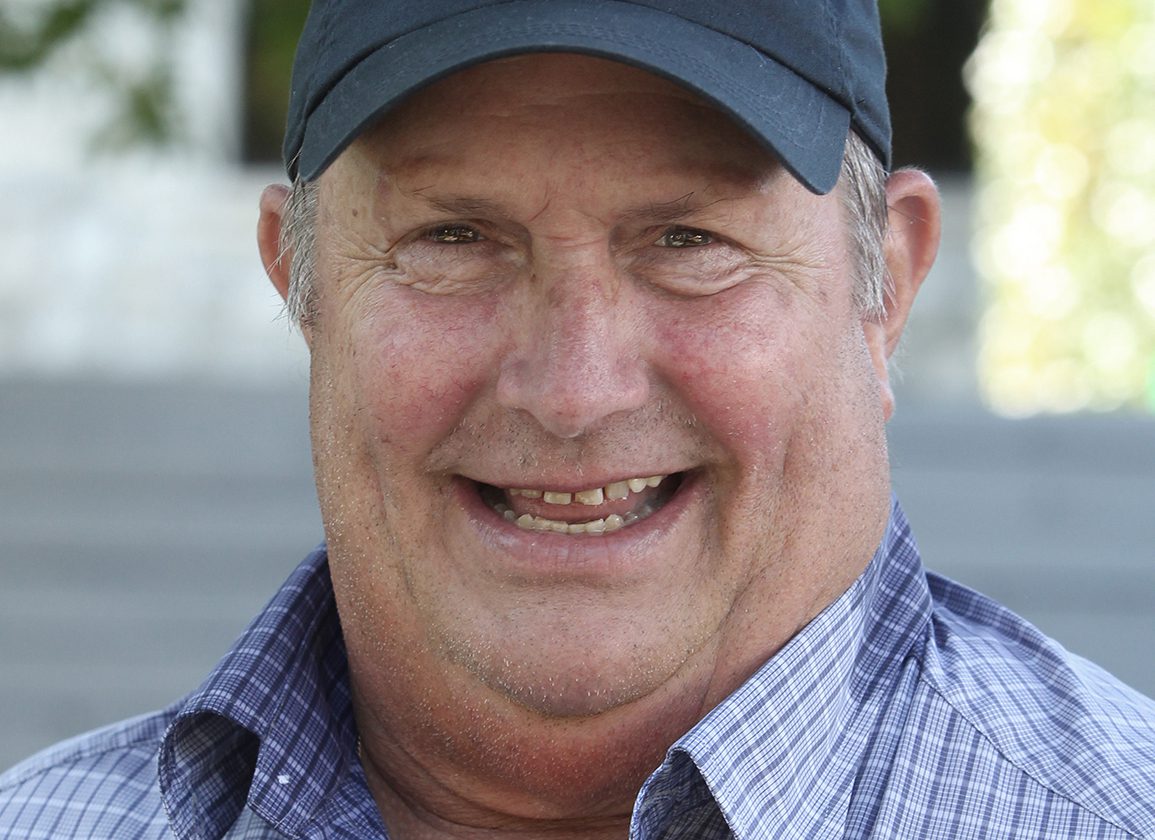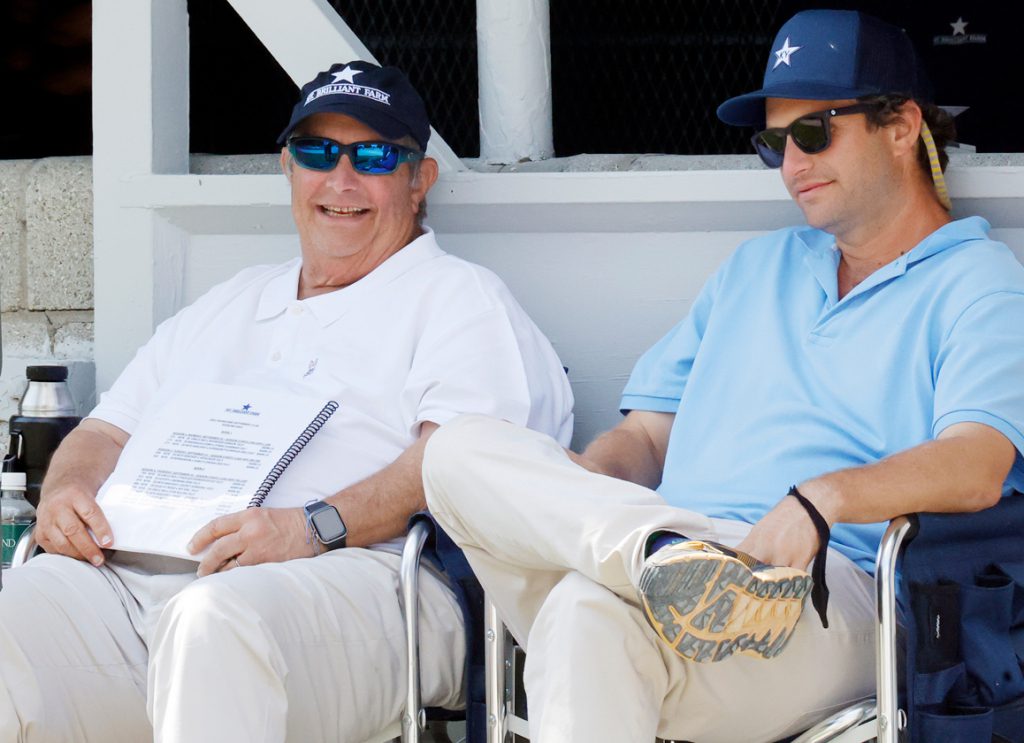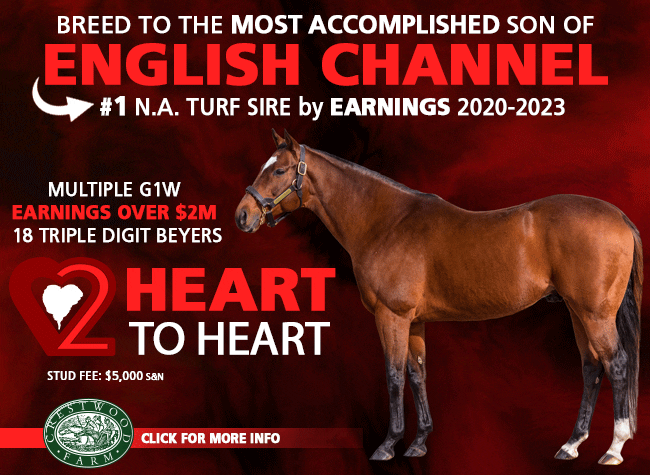By Chris McGrath
They call it “nominative determinism.” Your name suggests your path in life: like the world's fastest man being a Bolt. On that basis, you would say that being born a Goodman raises expectation enough–without then going ahead and buying yourself a farm named Mt. Brilliant.
The last year or so, however, suggests that things are playing out much as they should. Last September, TOBA presented Greg Goodman with the Robert N. Clay Award for his work in preserving horse country around Lexington from development. In April, the KTA/KTOB honored him with the William T. Young Humanitarian Award, reserved for no less a person or organization in the industry than one who “recognizes and promotes the human endeavor.” In between, moreover, the Mt. Brilliant graduate Extra Anejo (Into Mischief) has flashed potential to prove one of the best sophomores of the crop; and while the farm's Keeneland consignment this time couldn't quite match that colt's $1.35 million sale a couple of Septembers ago, it did feature a $850,000 son of Candy Ride in Book 2.
All rather brilliant, rather than merely good. But the relaxed figure presiding over the Mt. Brilliant draft at the recent auction welcomes a visit from TDN with a pleasing blend of self-deprecation and affability. It is a long time now, after all, since he first came here for a November Sale, a greenhorn sent by his dad to buy a couple of mares for a stallion they were standing back in Texas. He was given a budget of $45,000 for one, and $35,000 for the other.
“And back then of course there weren't cellphones or anything,” Goodman recalls. “So he couldn't be telling me, 'Okay, bid,' or, 'Don't worry, go on, you can go over.' And I'm sitting there bidding on this mare, and now I'm getting confused which one was $35,000 and which $45,000. And my dad didn't suffer fools very much.
“So I've bid $35,000. And then she sold to the next bid, $37,000 or $38,000, whatever it was. And at this point I'm really scared. 'Okay, I really hope this was the right one.' So I called him and he was like, 'Why did you stop at $35,000 on that mare?' By that time, I knew that I had got them the right way round. But he said, 'I meant $35,000 or around there.'”
“No!” Goodman replied. “You never mean anything different than what you say! If I'd bought her, you'd be yelling at me, telling me I had to pay.”
He chuckles at the memory. “My dad was tight,” he says. “Didn't spend any money, except on horses. I mean, he drove a crappy car. I had to buy him his first decent one, his first cellphone, too. Because he'd been like, 'Why would I want to spend money on that thing? They're going to charge me every month. I can just stop and use a payphone.' But he would spend money on gambling, and horses.”
And could afford do so, of course. Because this was Harold V. Goodman, founder in 1975 of an air-conditioning manufacturer that would become the second largest in the world.
Proxy
-Monmouth-Cup-Joel-Rosario-Michael-Stidham-SA5_1605-PRINT-Sarah-Andrew-1024x743.jpg" alt="" width="1024" height="743" /> Michael Stidham with Joel Rosario | Sarah AndrewJust as Goodman is sharing these memories of his dad, Michael Stidham calls by the barn. Stidham was still a very young man when given his start by Goodman Sr., who had hitherto been a patron of Stidham's own father. In fact, Stidham's first graded stakes winner was in his silks: Manzotti, a son of Nijinsky imported from Europe who later stood on the Goodman farm in Texas. In turn Manzotti's homebred daughter, Two Altazano, was Stidham's first Grade I winner in the Coaching Club American Oaks.
“His dad was a visionary,” Stidham attests. “In his business, in horse racing, in everything he did: he had a way of knowing.”
“Killed it,” Goodman agrees. “He was a thinker, a deep thinker.”
“He really was an amazing man,” Stidham says. “And he passed it on to this guy.”
Goodman firmly demurs, and Stidham teases him by accepting that he is only “almost as good” as his late father. But Goodman does grant that a love of horses is most certainly in the blood.
“My father raced all his life,” he says. “I have pictures of him aged 20, holding some Quarter Horse that he'd race down the streets in Houston. His buddies all used to have horses, and they'd put these little jockeys on them and race down Main Street in the afternoons.
“My dad was leading breeder in Texas five years in a row. And he had a lot to do with getting parimutuel betting passed there. So I never went on a vacation in my life that didn't involve a racetrack. From the time I was 17 or 18, weekend after weekend, I'd be driving with friends to Evangeline Downs, sometimes Delta Downs. You could stay in the Howard Johnson's for cheap, and sometimes you could pay for that and your gas from betting. And other times you're trying to scrape a few pennies together to get home. But it was always a blast.”
The real clincher, for Goodman, was when his father partnered in a $2.9 million Seattle Slew yearling bought at Keeneland July Sale in 1990. As Goodman puts it: “I mean, A.P. Indy was so exciting that I didn't have any choice but to go into the horse business.”
On his father's death, in 1996, Goodman inherited five shares in A.P. Indy, by then at stud. For someone who had just bought a storied Bluegrass farm, those comprised an ideal foundation for a breeding program.
“I'd been looking at a bunch of farms,” he recalls. “It was a gorgeous day, and I just sat under this big shade tree, looking at it. I mean, the place was really rough. But I was like, 'Man, I just love this piece of land. It's beautiful.' It had those undulations that are so good for the horses, and the soil is classified number one in the county. I think a lot of that was because there hadn't been horses on it for 50, 60 years. It had been just crops and cattle.”
Goodman read up the long history of Mt. Brilliant, and was inspired. He read how the original land grant to the Russell family, in recognition of military service, had been signed in 1774 by Thomas Jefferson; how the farm was named for the Virginia estate of Patrick Henry, who had sealed that deal; about the miraculous survival of Kentucky politician and abolitionist Cassius Clay in the duel at Russell Cave in 1845; and about the farm's 20th Century fame under James Ben Ali Haggin.
“And then I wanted to expand a little bit and bought a farm next to us, Faraway, which was where Man o' War was raised,” Goodman explains. “And since the 1960s there hadn't been a thing there, not cows, not a crop, nothing. It had even more rolling hills, and it had more of the Elkhorn running through it. So we got more Elkhorn, ended up with a mile and a half. In the old days they would say that there'd never been a Kentucky Derby winner that didn't drink out of that water, and my farms just flow straight down there. I think that's what makes the soil so good. That, and all the limestone deposits.”
Around a decade ago, there was a further expansion into Poplar Hill. Throughout, even if bricks and mortar were not always so scrupulously preserved, the land itself has been treated as sacrosanct. Much of it has been placed into a conservation scheme that prohibits development.
And then came a day when Goodman hosted members of the city council to meet an informal lobby of horse farmers, who were resisting proposals for rural development.
The vice-mayor said to Goodman: “You guys all stay out here on your farms. You never come into town. Y'all never deal with anything unless it's in your backyard, or affecting you.”
Goodman looked at him across the table. “Just be careful of what you wish for!” he said.
“And the Fayette Alliance was born that minute,” he says. “So for 17 years since we've been fighting as hard as we can to save the farmland. It's a two-sided coin. We look at protecting the rural area, and also making downtown a better place to live. Because this land is a finite resource. We have the best environment in the world for raising horses, and you just don't want to see it destroyed.”
This is once again a major battleground, the council having proposed a 5,000-acre urban expansion.
“They brought in 5,000 acres 23 years ago, and still have 2,500 acres of that left,” Goodman says. “And besides that, there's about 13,000 blighted, undeveloped and underdeveloped acres already inside the urban service area. Lexington burns about 110 acres a year. So that's over 200 years, at the current burn rate, of available land. You add this 5,000 acres, and it's 250 years. Which would basically be like them planning Lexington, and everything about it, in 1800.”
Goodman scoffs at the notion that affordable housing is central to the project. “The big builders that are pushing for this haven't built an affordable house in Lexington, ever,” he claims. “So part of our fight is to say, 'Okay, y'all can do it, but we're going to mandate 20 percent has to be affordable housing.' And would they cry!”
Through the courts, the Alliance is asserting that development can only be recommended, after due analysis, by the planning commission; and that the process needs to start over.
The Alliance recently conducted a survey that showed 77 percent of the community against expansion, with only 18 percent in favor. And Goodman stresses that preservation of land for the Thoroughbred industry actually represents its most economically fertile use.
“Creates $3 billion for this county,” he says succinctly. “The only thing in town that brings more money to the community is the University of Kentucky and the hospital, combined. And that doesn't include the tourism dollars that we bring in. At least 10 percent of the community is involved in the horse business. And that's without things like all the lawyers and accountants we need for our businesses.”
So far as Mt. Brilliant's own business is concerned, the aspiration is commercial but realistic.
“Well, I never expect to maintain my lifestyle through the horse business,” acknowledges Goodman. “But I do treat it like a business. Some years we're profitable, some years we're not. But it wouldn't be as much fun if I wasn't trying to make money, and that's something I will expect to do overall.
“Now that I'm getting older, I want to dive into the racing side a bit more. But, to me, to sell a horse for a lot of money is as exciting as winning a Grade I. The sale really excites me. Keeneland September is my favorite week of the year, as well as the most stressful. You've three years invested before you even bring a horse here. A few months of planning; then you work at getting the mare in foal; 11 months of gestation; 18 months raising the horse. So I love the tactical part of it, the decision-making along the way.”
As a rule–though he has made an exception for two Triple Crown winners–he will only use a new stallion if he has bought a share. Why, he asks, should he prove someone else's stallion? And the mare, in his view, contributes at least as much to the equation.
Goodman has repeatedly imported mares from Europe and was especially drawn to the Ballymacoll dispersal in 2017. He coveted Justlookdontouch (Ire) (Galileo {Ire}), but had to yield to Peter Brant and instead bought two of her daughters, Abingdon (Street Cry {Ire}) for 1,050,000gns and Superioritycomplex (Ire) (Hard Spun) for 400,000gns—the latter in partnership with his friend Orrin Ingram. And Extra Anejo is her first foal.
“He's just a big, beautiful horse and was always confident,” Goodman recalls. “Smart horse, did everything right. He was the man. I think he might still be the man, just nobody knows it yet. He came out of the [GI] Haskell dead lame. They did X-rays, everything, couldn't find anything. And then it turned out he had a deep bone bruise in his foot. So he's having 60 days off.”
It was not the colt's first hold-up, as he reportedly had a chip removed after his dazzling debut at Keeneland last fall. As a result, he still has very few miles on the clock.
“Actually, I sat next to Ron Winchell at dinner the other night and he told me that he still has a lot of faith in Extra Anejo,” Goodman said. “He thinks he's an incredible horse and he'll be back. I do think that he'll maybe prove the most talented horse we have raised. He's massive, but so smooth. He hits the ground like a cat.”
With luck, then, fresh chapters will be added to a saga dating back to a first graded stakes winner, bought as a weanling from his father's estate at the November Sale for just $8,000: a homebred son of Manzotti, Desert Air, who won the GIII Razorback at Oaklawn. The farm has since raised a GI Belmont S. winner in Creator (Tapit), sold as a Keeneland September yearling for $440,000, while Private Mission (Into Mischief) has been another to advertise the nursery with three graded stakes over the past couple of years.
But nothing has been more fulfilling than the growing involvement of Goodman's sons. “I'm so excited that they're in it,” he says. “They like the racing as much as I did when I was their age, and they're better horsemen than me. They like the racing side, and I'm ready for that again. I like that we have no raceday medication, and feel ready to compete again.”
Even so, life will never be as good as where it's “Brilliant.”
“I mean, I love just being on my farm,” Goodman says with enthusiasm. “The sale and the races get me away from there–and the winter, too! But otherwise, I'd rather be there than anywhere. I don't go out to dinner, go places much. I like to spend the evenings on the porch, just hanging out. I'm crazy, I'll drive around my farm like 10 times a day, just checking everything out. Everybody that works for me hates that, because I'm like, 'That fence board needs to be fixed.' And they're like, 'What fence board!?'
“I'm from Texas and I'm still a Texan. But I love it here and spend as much time here as I can. It's just a beautiful, beautiful place. I love this community; it has been very welcoming to me and my family over the last 30 years. I moved my kids here when they were young. They grew up here, and then went off to colleges all over the country. But they all came back. My grandchildren are here. It's home now. That's hard for a Texan to say. But it's the truth.”
Not a subscriber? Click here to sign up for the daily PDF or alerts.













